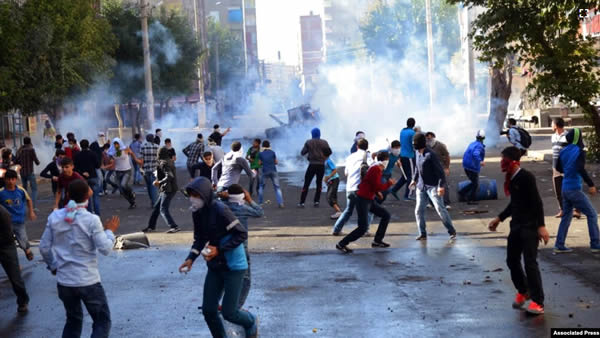
When a gunfight erupted during clashes in Diyarbakir in October 2014, video journalist Rojhat Dogru was at the center of the action.
At one point, a little too close. Hit by a bullet, Dogru was rushed to a hospital, where he uploaded footage to the Iraq-based Gali Kurdistan TV while being treated.
The coverage won Dogru an award but now, seven years after the clashes, the video journalist is fighting a life sentence.
A court in Diyarbakir last week issued the sentence after convicting Dogru of “disrupting the unity and integrity of the state.” It further sentenced him to 10 years and 10 months for “attempted deliberate killing,” and a year and three months for “propagandizing for a terrorist organization.”
The verdict has appalled press freedom advocates.
“This is the heaviest punishment I’ve seen recently. There is no murder, no bombing, but it is just news coverage,” Veysel Ok, co-director of Turkey’s Media and Law Studies Association (MLSA), told VOA.
Violent clashes
As a Kurdish journalist, Dogru covered events in Diyarbakir and the region for Gali Kurdistan TV, including footage on what is known as the Kobani protests in 2014. That coverage earned him a Southeastern Journalists Association award.
Protests broke out that year after pro-Kurdish groups claimed Ankara was reluctant to help Kurds in Kobani, a city in neighboring Syria besieged by the Islamic State militants.
Police were called in as the protests turned violent, with clashes between supporters of the Free Cause Party, an offshoot of a violent Kurdish Islamist militant group, and PKK supporters. The PKK is designated a terrorist organization by the U.S. and Turkey.
Official figures put the death toll at 37, and an indictment in the mass court case lists hundreds wounded as well as schools and public buildings damaged and over 1,700 homes and businesses looted.
The Turkish government accuses the pro-Kurdish People’s Democratic Party (HDP) of instigating the protests, and over 100 people, including former HDP co-chairs Selahattin Demirtas and Figen Yuksekdag, have stood trial for the protests.
The HDP denies the charges against it.
From awards to lawsuits
In an interview about his coverage that day, Dogru spoke of the crucial role journalists play in documenting such events.
“I took the footage of the moments when two groups shot each other on the streets in an unbiased and objective way. This footage was crucial in terms of showing that both sides in the conflict had weapons in their hands,” Dogru said in an article published on the MLSA’s website days before the court issued its verdict.
“Although I was injured, I continued to take a video. I even took video of the moments when I was injured with my camera,” Dogru said.
The journalist was left needing treatment for injuries to his chin, stomach and leg.
The first lawsuit against Dogru was filed three years after the clashes, the journalist’s lawyer, Resul Temur, told VOA.
The plaintiff, named in some reports as Ridvan Ozdemir, alleges he was caught in the clashes and injured by a gun fired from Dogru’s direction.
Ozdemir alleged that Dogru shot him, and a case was filed on charges of “disrupting the unity and integrity of the state” and “attempted deliberate killing.”
‘Beyond normal’
Dogru denied the allegation, telling the MLSA “it is beyond normal to shoot with a gun in one hand while taking a footage with the camera in the other.”
He added that an expert witness watched the footage and, in a report filed with the court, said that Dogru had not used a gun.
During the trial, said Temur, the plaintiff did not remember whether Dogru was holding a camera.
“We said that it was strange that he did not remember the camera but remembered the gun,” Temur said.
More charges followed in 2018 when authorities allegedly found Dogru’s number on a PKK member detained by the police in Diyarbakir.
In December of that year, Dogru was held in pretrial detention on accusations of “membership of a terrorist organization.” He was released in February 2019 under judicial control.
A judge in Diyarbakir later combined the legal charges into one case, which reached its conclusion on January 6.
An arrest warrant was also issued for the journalist, who did not attend the hearing in person.
Temur told VOA they have appealed and called the trial “biased.”
‘A heavy price’
The verdict astonished press freedom advocates who believe that a higher court should reverse it on appeal.
“It is against the nature of the job of a cameraman to shoot with one hand and use a gun with another. This was refuted by the expert report [in the court]. So, the punishment is not acceptable,” Mucahit Ceylan, president of the Southeast Journalists Association, told VOA.
“In this region at critical times, [Dogru] risked his own life to cover the news, was injured, and now he is punished,” Ceylan said.
He believes the verdict will be overturned on appeal.
Ok, the MLSA co-director, was also shocked by the heavy sentence.
“Of course, there is a possibility that this will be reverted from the Constitution and European Court of Human Rights, but [until then] he will eventually spend years in prison,” Ok told VOA. “A heavy price will be paid, and there is nothing legal about it.”
Source: voanews.com























